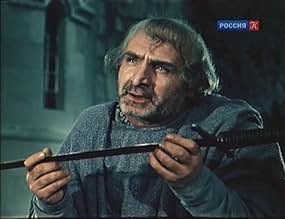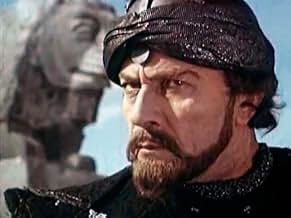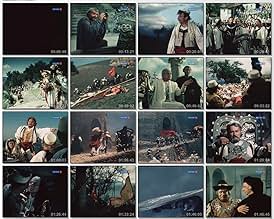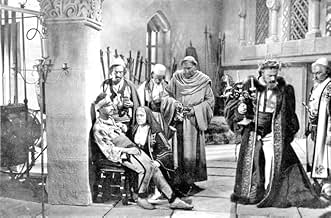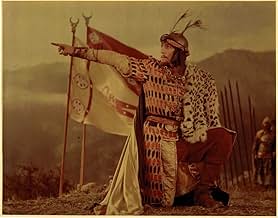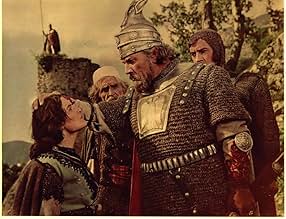Füge eine Handlung in deiner Sprache hinzuThis is the true story of the National Hero of Albanians, George Kastrioti Scanderbeg, from his birth to his death. 1405-1468. Based mainly upon the monk writer Marin Barleti, the movie star... Alles lesenThis is the true story of the National Hero of Albanians, George Kastrioti Scanderbeg, from his birth to his death. 1405-1468. Based mainly upon the monk writer Marin Barleti, the movie starts off with how the boy Scanderbeg was taken hostage by the ottoman turks and trained from... Alles lesenThis is the true story of the National Hero of Albanians, George Kastrioti Scanderbeg, from his birth to his death. 1405-1468. Based mainly upon the monk writer Marin Barleti, the movie starts off with how the boy Scanderbeg was taken hostage by the ottoman turks and trained from them until he became one of the most outstanding warriors of the Ottoman Empire, then lat... Alles lesen
- Auszeichnungen
- 2 Gewinne & 1 Nominierung insgesamt
- Dafina
- (as Veriko Andjaparidze)
Empfohlene Bewertungen
Indeed, he was even revered by the militantly atheistical regime of the country's Communist dictator, Enver Hoxha. This film was made in 1953, during the Communist era, as a Soviet-Albanian coproduction, although the Soviet contribution was the greater, unsurprisingly given the small size of Albania and its economy. Most of the film was a shot in the Soviet Union by a Russian director, Sergei Yutkevich and it was made in Russian using Soviet (but not necessarily ethnically Russian) actors; Skanderbeg himself is played by a Georgian, Akaki Khorava. The film was then dubbed for showing in Albania; it was this Albanian-language version which I recently came across on YouTube.
As a child, the young George Kastrioti (Skanderbeg's real name) is sent as a hostage to the court of the Ottoman Sultan, where he raised as a Muslim and becomes a warrior in the Sultan's army. His love for his homeland, however, impels him to return to Albania where he puts himself at the head of the nationalist cause and leads his people in their struggle for freedom.
The film was recommended to me by our guide in Albania, who described it as the Communist bloc's answer to Western films such as "Spartacus" and "The 300 Spartans". In fact, both those films were made a few years after "The Great Warrior Skanderbeg", although in its grand visual style it has something in common with earlier Hollywood epics such as "Samson and Delilah" or "Quo Vadis?"
Although it was made during the Communist period, it is not notably Communist in its themes; there is, for example, no attempt to portray Skanderbeg as a proto-socialist. It is about patriotism and national struggles rather than about class struggles, with the Albanians (apart from a few pro-Turkish traitors) heroic and the Turks bloodthirsty villains. The way in which various other nationalities are portrayed, however, may owe something to Cold War rivalries. The villains, apart from the Turks, are the Serbs and the Venetians, shown as treacherous and unreliable allies of the Albanians, whereas their true friends are the Poles and Hungarians. In 1953, of course, Italy, like Turkey, was a member of NATO and Tito's Yugoslavia, although officially Communist, was despised by Hoxha's regime as "revisionist". Poland and Hungary, however, were Albania's allies in the Warsaw Pact. After Albania broke away from the Soviet Bloc in 1960, the film continued to be shown, but now it had a different meaning. Skanderbeg became a symbol of gallant little Albania standing alone against a hostile world.
Trying to evaluate the film is a difficult task for a non-Albanian. On the one hand, it is often grand and stirring. On the other, it can at times seem static and the acting does not always seem inspired, although this may be due to the fact that I was watching it in a dubbed version. I always, however, found it worth watching of the insights it affords into another nation's culture and history. 7/10.
Gjergj Kastrioti Skenderbeu (1405 - January 17 1468), better known as Skanderbeg, is the most prominent figure in the history of Albania. He is also known as the Dragon of Albania and is the national hero of the Albanians. He is remembered for his struggle against the Ottoman Empire, through the work of his first biographer, Marin Barleti.
The movie definitely needs a remake or something like this because it was shot in '53 and most of cast is Russian or Romanian or Belgian as far as i remember. (this is due to strong communist friendship with them) The movie quality is poor, sound also. (even though it has a magnificent score performed by the national radio television orchestra)
Biography
Gjergj Kastrioti Skenderbeu (1405 - January 17 1468), better known as Skanderbeg, is the most prominent figure in the history of Albania. He is also known as the Dragon of Albania[1] and is the national hero of Albanians. He is remembered for his struggle against the Ottoman Empire, through the work of his first biographer, Marin Barleti.
In English, his names have variously been spelled: George, Gjergj, Giorgio; Castriota, Kastrioti, Castrioti, Castriottis, Kastriotes, Castriot, Kastriot; Skanderbeg, Scanderbeg, Skenderbeg, Skanderbeu, or Scander-Begh.
His father was a lord of the Kastriotis family. Gjon Kastrioti[5], descended from an ancient family from Mat, and controlled a principality including Mat, Krujë, Mirditë and Dibër.[6]. Voisava, Skanderbeg's mother, was from the Tribalda family[5], a princess[7] from Polog valley[8]. Although he fought in the service of the Ottoman Empire, Skanderbeg soon switched sides and fought against the Ottoman Empire until the time of his death.
IT IS NOT THE TOOL BUT THE CRAFT - ROLAND EMMERICH
He was distinguished as one of the best officers in several Ottoman campaigns both in Asia Minor and in Europe, and the Sultan appointed him General. He even fought against Greeks, Serbs and Hungarians, and some sources says that he used to maintain secret links with Raguse, Venice, Vladislas of Hungary et Alphonse V of Naples. Sultan Murat II gave him the title Vali which made him the General Governor of some provinces in central Albania. He was respected everywhere but he missed his country.
In 1443, during the battle against the Hungarians of Hunyadi in Nish (in present day Serbia), he abandoned the Ottoman Army and captured Kruja, his father's seat in middle Albania. Above the castle he rose the Albanian flag, a red flag with the black double-headed eagle, the present-day Albanian flag, and pronounced to his countrymen the famous words: "I have not brought you liberty, I found it here, among you". He managed to unite all Albanian princes at the town of Lezha (League of Lezha, 1444) and united them under his command to fight against the Turks.
During the next 25 years he fought, with forces rarely exceeding 20,000 against the most powerful army of that time and defeated it for 25 years. In 1450 the Turkish army was led by the Sultan Murad II in person, who died after his defeat in the way back. Two other times, in 1466 and 1467, Mehmed II, the conqueror of Constantinople, led the Turkish army himself against Skenderbeg and failed too. The Ottoman Empire attempted to conquer Kruja 24 times and failed all 24 of them.
Skenderbeg's military successes evoked a good deal of interest and admiration of the Papal state, Venice and Naples, themselves threatened by the growing Ottoman power across the Adriatic. The Albanian warrior played his hand with a good deal of political and diplomatic skill in his dealings with the three Italian states. Hoping to strengthen and expand the last Christian bridgehead in the Balkans, they provided Skenderbeg with money, supplies and occasionally with troops. One of his most powerful and consistent supporters was Alfonso the Magnanimous (1416-1458), the Aragone king of Naples, who decided to take Skenderbeg under his protection as vassal in 1451, shortly after the latter had scored his second victory against Murad II. In addition to financial assistance, the King of Naples undertook to supply the Albanian leader with troops, military equipment as well as with sanctuary for himself and his family if such a need should arise.As an active defender of the Christian cause in the Balkans, Skenderbeg was also closely involved with the politics of four Popes, one of them being Pius II (1458-1464) or Aeneas Sylvius Piccolomini, the Renaissance humanist, writer and diplomat.
Profoundly shaken by the fall of Constantinople in 1453, Pius II tried to organise a new crusade against the Turks; consequently he did his best to come to Skenderbeg's aid, as two of his predecessors Nicholas V and Calixtus III, had done before him. This policy was continued by his successor, Paul II,(1464-1473).They gave him the title Athleta Christi.
For a quarter of a century he and his country prevented Turks from invading Catholic Western Europe.
After his death from natural causes in 1468 in Lezha, his soldiers resisted the Turks for the next 12 years. In 1480 Albania was finally conquered by the Ottoman Empire. When the Turks found the grave of Skenderbeg in Saint Nicholas church of Lezha, they opened it and held his bones like talismans for luck. In 1480 the Turks invaded Italy and conquered the City of Otranto.
Skenderbeg's posthumous renown was by no means confined to his own country. Voltaire thought the Byzantine Empire would have survived had it possessed a leader of his quality. A number of poets and composers have also drawn inspiration from his military career. The French sixteenth-century poet Ronsard wrote a poem about him and so did the nineteenth-century American poet Longfellow. Antonio Vivaldi, too, composed an opera entitled Scanderbeg.
Skenderbeg today is the National Hero of Albania. Many museums and monuments are raised in his honour around Albania, and among them the Museum of Skenderbeg in his famous castle in Kruja.
Bibliography: Noli, Fan S.: George Castrioti Scanderbeg, New York, 1947 Logoreci, Anton: The Albanians, London, 1977
Wusstest du schon
- WissenswertesThe film was remastered in 2012 for Albania's 100th anniversary for independence.
Top-Auswahl
- How long is Skanderbeg?Powered by Alexa
Details
- Laufzeit1 Stunde 35 Minuten
- Sound-Mix
- Seitenverhältnis
- 1.37 : 1
Zu dieser Seite beitragen


